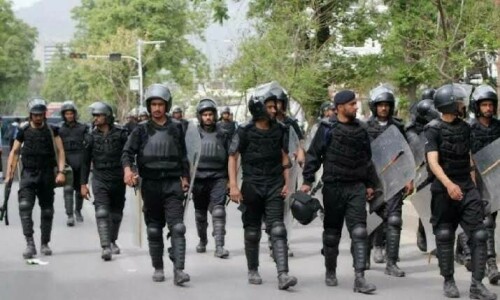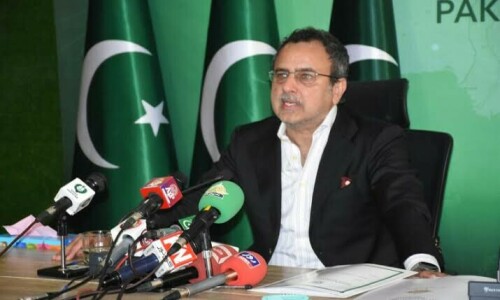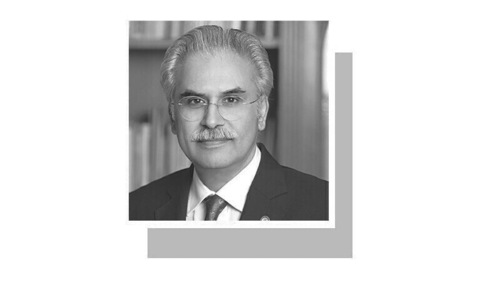RAWALPINDI, Dec 8: Companies from China, India, Russia and some other countries routinely resort to bribery to do business abroad, says Transparency International’s ‘2008 Bribe Payers Index’ (BPI), released on the occasion of the World Anti-Corruption Day being observed on Tuesday.
Belgium and Canada shared first place with a score of 8.8 on a scale of 10 (very clean), indicating that firms from these countries were least likely to resort to bribery.
The Netherlands and Switzerland shared third place on the index, scoring 8.7.
At the other end of the spectrum, Russia ranked last with a score of 5.9, just below China (6.5), Mexico (6.6) and India (6.8).
The 22 countries and territories ranked in the index are: Australia, Belgium, Brazil, Canada, China, France, Germany, Hong Kong, Italy, India, Japan, Mexico, Netherlands, Russian Federation, Singapore, South Africa, Spain, South Korea, Switzerland, Taiwan, United Kingdom and United States.
The 2008 BPI is based on a survey of senior business executives working in 26 countries: Argentina, Brazil, Chile, Czech Republic, Egypt, France, Germany, Ghana, Hungary, India, Indonesia, Japan, Malaysia, Mexico, Morocco, Nigeria, Pakistan, the Philippines, Poland, Russian Federation, Senegal, Singapore, South Africa, South Korea, United Kingdom and the United States.
December 9 marks the anniversary of the signing of the UN convention against corruption. Pakistan ratified the convention in August 2007.
The BPI is a ranking of 22 of the world’s wealthiest and most economically-influential countries according to the likelihood of their firms to bribe abroad. “These countries account for approximately 75 per cent of total foreign direct investment outflows and export goods worldwide.”
Business executives provide their perception of sources of foreign bribery, and these views form the basis of the index.
It shows public works and construction companies to be the most corruption-prone when dealing with the public sector, and most likely to exert undue influence on government policies and decisions.
The survey also looks at the likelihood of firms in 19 sectors to engage in bribery. In the first of two new sectoral rankings, companies in public works contracts and construction; real estate and property development; oil and gas; heavy manufacturing; and mining were seen to bribe officials most frequently. The cleanest sectors were identified as information technology, fisheries and banking and finance.
A second sectoral ranking evaluates the likelihood of companies which attempt to wield undue influence on government rules and decision-making through ‘private payments’ to public officials.
Public works contracts and construction; oil and gas; mining; and real estate and property development companies were most likely to use illegal payments to influence the state. The companies in banking and finance sectors are worse in terms of state capture than in willingness to bribe public officials, a significant finding in light of the ongoing global financial crisis.
According to the Pakistan chapter of the Transparency International, the solution to Pakistan’s financial crises lies in an open government system, willing to implement good governance and transparent rule of law, and fully independent judicial system, which permits the citizens to follow up cases of maladministration.
On the organisation’s Corruption Perception Index 2008, Pakistan is 45th corrupt country out of 180 surveyed countries.
The Transparency International has urged the government to direct regulatory authorities to make public their reports to restore confidence of people, investors and donor agencies.
Under the Public Procurement Rules of 2004, all contracts and evaluation reports are to be declared as public documents.
A recent World Bank report enlists corruption among the major reasons hindering development projects in Pakistan. Other reasons included lack of transparency and corruption, delays in procurement.
The report on the assessment of Pakistan Infrastructure Implementation Capacity carried out jointly by World Bank and Planning Commission determined that about 15 per cent of country’s development Budget of 2007 was the cost of corruption in procurement alone.
The development budget for 2008-2009 is estimated to be over Rs1 trillion, and on application of PPRA Rules, the government can save Rs150 billion, the TI says.










































Dear visitor, the comments section is undergoing an overhaul and will return soon.